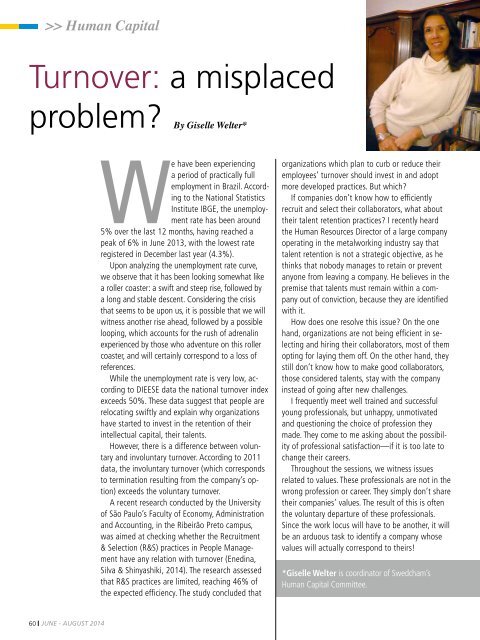Nordic-Light-Jun2014-Aug2014
Nordic-Light-Jun2014-Aug2014
Nordic-Light-Jun2014-Aug2014
Create successful ePaper yourself
Turn your PDF publications into a flip-book with our unique Google optimized e-Paper software.
Human Capital<br />
Turnover: a misplaced<br />
problem<br />
By Giselle Welter*<br />
We have been experiencing<br />
a period of practically full<br />
employment in Brazil. According<br />
to the National Statistics<br />
Institute IBGE, the unemployment<br />
rate has been around<br />
5% over the last 12 months, having reached a<br />
peak of 6% in June 2013, with the lowest rate<br />
registered in December last year (4.3%).<br />
Upon analyzing the unemployment rate curve,<br />
we observe that it has been looking somewhat like<br />
a roller coaster: a swift and steep rise, followed by<br />
a long and stable descent. Considering the crisis<br />
that seems to be upon us, it is possible that we will<br />
witness another rise ahead, followed by a possible<br />
looping, which accounts for the rush of adrenalin<br />
experienced by those who adventure on this roller<br />
coaster, and will certainly correspond to a loss of<br />
references.<br />
While the unemployment rate is very low, according<br />
to DIEESE data the national turnover index<br />
exceeds 50%. These data suggest that people are<br />
relocating swiftly and explain why organizations<br />
have started to invest in the retention of their<br />
intellectual capital, their talents.<br />
However, there is a difference between voluntary<br />
and involuntary turnover. According to 2011<br />
data, the involuntary turnover (which corresponds<br />
to termination resulting from the company’s option)<br />
exceeds the voluntary turnover.<br />
A recent research conducted by the University<br />
of São Paulo’s Faculty of Economy, Administration<br />
and Accounting, in the Ribeirão Preto campus,<br />
was aimed at checking whether the Recruitment<br />
& Selection (R&S) practices in People Management<br />
have any relation with turnover (Enedina,<br />
Silva & Shinyashiki, 2014). The research assessed<br />
that R&S practices are limited, reaching 46% of<br />
the expected efficiency. The study concluded that<br />
organizations which plan to curb or reduce their<br />
employees’ turnover should invest in and adopt<br />
more developed practices. But which<br />
If companies don’t know how to efficiently<br />
recruit and select their collaborators, what about<br />
their talent retention practices I recently heard<br />
the Human Resources Director of a large company<br />
operating in the metalworking industry say that<br />
talent retention is not a strategic objective, as he<br />
thinks that nobody manages to retain or prevent<br />
anyone from leaving a company. He believes in the<br />
premise that talents must remain within a company<br />
out of conviction, because they are identified<br />
with it.<br />
How does one resolve this issue On the one<br />
hand, organizations are not being efficient in selecting<br />
and hiring their collaborators, most of them<br />
opting for laying them off. On the other hand, they<br />
still don’t know how to make good collaborators,<br />
those considered talents, stay with the company<br />
instead of going after new challenges.<br />
I frequently meet well trained and successful<br />
young professionals, but unhappy, unmotivated<br />
and questioning the choice of profession they<br />
made. They come to me asking about the possibility<br />
of professional satisfaction—if it is too late to<br />
change their careers.<br />
Throughout the sessions, we witness issues<br />
related to values. These professionals are not in the<br />
wrong profession or career. They simply don’t share<br />
their companies’ values. The result of this is often<br />
the voluntary departure of these professionals.<br />
Since the work locus will have to be another, it will<br />
be an arduous task to identify a company whose<br />
values will actually correspond to theirs!<br />
*Giselle Welter is coordinator of Swedcham’s<br />
Human Capital Committee.<br />
60 JUNE - AUGUST 2014


